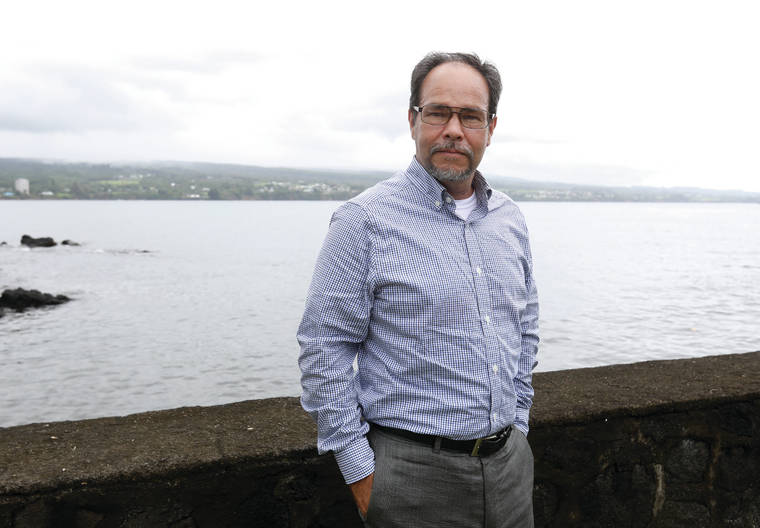Christopher Bridges, one of three attorneys running for Hawaii County prosecutor, said he’s “open to institute real change and real reform in our criminal justice system.”
The 48-year-old Bridges, who’s been a lawyer for two-plus decades, graduated from Pepperdine University School of Law and has worked as a public defender in San Diego and a deputy prosecutor on Kauai and the Big Island before starting his own private practice as a defense attorney in Hilo in 2011.
With six years as a prosecutor and 15 in criminal defense, Bridges claims “over 60 jury trials” in experience.
He said he’s seeking the office currently held by mayoral candidate Mitch Roth because, “It’s very important for the community that the Office of the Prosecuting Attorney has vision, has leadership and has an experienced captain at the helm.”
He described his opponents — Deputy Prosecutor Kelden Waltjen and Jared “Kamaka” Auna, a former deputy prosecutor who’s now a private criminal defense lawyer — as “great people” who “don’t have the experience to run a department of that size.”
“They don’t have the experience to train their people properly and create a culture of excellence. And that’s what our county deserves,” he said, citing his trial experience and history as first deputy in the Kauai County prosecutor’s office as his qualifications.
As of June 30, Bridges trails his opponents in fundraising and campaign spending. The only money he’s reported is $500 he loaned his campaign as seed money to open a bank account, and zero expenditures.
One change Bridges is seeking is to all-but-eliminate monetary bail in the county’s criminal justice system.
The state Department of Public Safety’s annual report said it costs $182 a day to incarcerate an individual in the state’s jails and prisons, which includes pretrial detainees at Hawaii Community Correctional Center. Bridges said bail should be eliminated for all but those deemed a danger to the community or an extreme flight risk.
“In Washington, D.C., they’ve shown this approach can work,” Bridges said. “Pretrial supervised release is much cheaper than detaining someone because they’re indigent, and the majority of defendants still show up to court as ordered.”
Bridges said when he arrived on Kauai, he “took over a narcotics unit that was in shambles.” He called the war on drugs “an abject failure” and added, “It’s time to take a step back.”
“Has the war on drugs decreased our drug usage? No. Has the war on drugs decreased crime? No. Has the war on drugs reduced recidivism rates? No,” he said. “It’s a war on people. And I saw the consequences of the drug war, in most circumstances, were more devastating to our community — and to families — than the drug use itself. When we’re taking mothers of small children and ripping them out of the home and sending them off to a prison on a different island, we’re not doing anything to break the cycle.”
According to Bridges, substance abuse and drug use need to be viewed as “more a public health issue instead of a purely penal one.”
“We find that substance abuse and drug use issues are usually the result of trauma, of some sort,” he said. “And usually, the trauma that leads to substance abuse is childhood trauma, be it the abuse of an uncle or father or grandfather, whether physical, psychological or sexual abuse. Or worse, being in a family with only one parent, where daddy’s not known, or not in the picture — or worse, in prison.”
Asked if the county has the social services available to change that picture, Bridges replied, “Currently, we don’t.”
“We have a good foundation,” he said. “We have some solid drug treatment centers here. What we don’t have is drug treatment that provides residential drug treatment with mental health services.
“We need to rethink what we’re doing to our citizens when we’re locking them up. And ask ourselves will locking them up benefit our community? Will it benefit this person’s family? Will it benefit this person upon re-entry? Because, for the most part, when we’re putting someone in prison, they’re coming out on the other end.
“The question is, what kind of person is coming out and what are we doing to ease their transition?”
Bridges said likely budget cuts in the face of the COVID-19 pandemic provide the opportunity to rethink.
“Should we be spending $182 a day to lock this person away in jail because they missed court?” he asked, rhetorically. “Are they a danger to our community? Or can our money be better spent elsewhere?
“Likewise, at the prosecutor’s office, if we look at focusing our energies on those who are predators — the true criminals in our community who lack empathy and are breaking into houses and hurting people vs. going after every unhoused person who is sleeping at the park, vs. locking up traffic offenders for missing court — I think we can do more with less.”
Email John Burnett at jburnett@hawaiitribune-herald.com.



